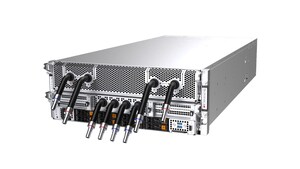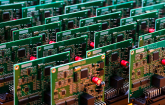Supermicro Deploys 30,000+ MicroBlade™ Servers to Enable One of the World's Highest Efficiency (1.06 PUE) Data Centers
Silicon Valley Fortune 100 Data Center Achieves 1.06 Power Usage Effectiveness with 280 Nodes per Rack Delivering Maximum Server Density and Efficiency
SAN JOSE, Calif., Feb. 6, 2017 /PRNewswire/ -- Super Micro Computer, Inc. (NASDAQ: SMCI), a global leader in compute, storage and networking technologies including green computing, has announced deployment of its disaggregated MicroBlade™ systems at one of the world's highest density and energy efficient data centers.
A technology-leading Fortune 100 company has deployed over 30,000 Supermicro MicroBlade servers, at its Silicon Valley data center facility with a Power Use Effectiveness (PUE) of 1.06, to support the company's growing compute needs. Compared to a traditional data center running at 1.49 PUE, or more, the new datacenter achieves an 88 percent improvement in overall energy efficiency. When the build out is complete at a 35 megawatt IT load power, the company is targeting $13.18M in savings per year in total energy costs across the entire datacenter.
The Supermicro MicroBlade system represents an entirely new type of computing platform. It is a powerful and flexible extreme-density 3U or 6U all-in-one total system that features 14 or 28 hot-swappable MicroBlade Server blades. The system deliver 86% improvement in power/cooling efficiency with common shared infrastructure, 56 percent system density improvement and lower initial investment versus 1U servers. The solution has 280 Intel® Xeon® processor-servers per rack and achieves 45 percent to-65 percent CAPEX savings per refresh cycle with a disaggregated rack scale design.
"With 280 Intel Xeon processor-servers in a 9-foot rack, and up to 86 percent improvement in system cooling efficiency, the MicroBlade system is a game changer," said Charles Liang, President and CEO of Supermicro. "Leveraging our Silicon Valley based engineering team and global service capabilities, Supermicro collaborated closely with the company's IT department and delivered a solution from design concept to optimally tuned, high-quality product with full supply chain and large-scale delivery support in five weeks. With our new MicroBlade and SuperBlade, we have changed the game of blade architecture to make blades the lowest in initial acquisition cost for our customers, not just the best in terms of computation, power efficiency, cable-less design, and TCO."
The Supermicro MicroBlade disaggregated architecture unlocks the interdependence between the major server subsystems enabling the independent upgrade of CPU+Memory, I/O, Storage and, Power/Cooling. Now each component can be refreshed on-time to maximize Moore's Law improvements in performance and efficiency versus waiting for a single monolithic server refresh cycle.
"A disaggregated server architecture enables the independent upgrades of the compute modules without replacing the rest of the enclosure including networking, storage, fans and power supplies, which refresh at a slower rate," said Shesha Krishnapura, Intel Fellow and Intel IT CTO. "By disaggregating CPU and memory, each resource can be refreshed independently allowing data centers to reduce refresh cycle costs. When viewed over a three to five year refresh cycle, an Intel Rack Scale Design disaggregated server architecture will deliver, on-average, higher-performing and more-efficient servers at lower costs than traditional rip-and-replace models by allowing data centers to independently optimize adoption of new and improved technologies."
The MicroBlade provides the perfect building block for a Rack-Scale design data center solution. The networking across all server blades is aggregated into just two ports for uplink through an integrated switch, eliminating the need for Top-of-Rack (ToR) switches and complex cabling. With up to 99% cabling reduction for the MicroBlade system, airflow is significantly improved, which in turn reduces the load on the cooling fans, resulting in even lower OPEX. Up to 86 percent cooling fan power efficiency improvement is achieved by sharing four cooling fans and integrated power modules across all 14 MicroBlade server blades. The MicroBlade enclosure is configured with a Chassis Management Module for unified management and redundant 2,000 watt Titanium Level certified digital power supplies for 96% energy efficiency. Supermicro MicroBlade is shipped with industry standard IPMI 2.0 and Redfish API designed to lower management overhead in large scale data centers. The MicroBlade also supports DP Intel Xeon E5-2600 v4/v3 processors (MBI-6128R-T2/T2X blade server part numbers).
In addition to the MicroBlade, Supermicro is introducing a new SuperBlade® architecture with more deployment options. The X10 Generation SuperBlade supports up to 10/14/20 ES-2600 v4 dual processor nodes per 7U chassis with many of the same features as the MicroBlade system. The new 8U SuperBlade® systems use the same Ethernet switches, chassis management modules, and software as the MicroBlade for improved reliability, serviceability, and affordability. The systems are designed to support DP and MP processors up to 205 watts in half-height and full-height blades, respectively. Similarly, the new 4U SuperBlade systems maximize performance and efficiency while enabling up to 140 dual-processor servers or 280 single-processor servers per 42U rack.
About the MicroBlade 3U Enclosure Deployed
- 30,000+ Intel® Xeon® Processor based Supermicro® MicroBlade™ Server blades
- Each 3U MicroBlade enclosure consists of 14 hot-swap server blades
- 56% better data center space utilization / density compared to previous solution deployed
- Up to 96.5% cable reduction
- Up to 2 Ethernet switches 2x 40Gb/s QSFP or 8x 10Gb/s SFP+ uplinks per enclosure
- High efficiency shared Titanium Level (96%+) digital power supplies
- 45% to 65% CAPEX savings due to disaggregated hardware architecture
About the MicroBlade 6U Enclosure
- Up to 28 hot-swap blade servers (56 UP or 28 Xeon DP nodes)
- Up to 98% cable reduction
- Up to 2 GbE switches with 2x 40Gb/s QSFP or 8x 10Gb/s SFP+ uplinks per enclosure
- Up to 8 (N+1 or N+N redundant) 2000W Titanium certified high-efficiency (96%) digital power supplies
New 8U SuperBlade Enclosure
- Up to 20 half-height 2-socket blade servers
- Up to 10 full-height 4-socket blade servers
- One 100G EDR IB or Omni-Path switch
- Up to 2 Ethernet switches (1G,10G) for Ethernet connectivity i
- One Chassis Management Module (CMM)
- Up to 8x (N+1 or N+N redundant) 2200W Titanium (96%) digital power supplies
New 4U SuperBlade Enclosure
- Up to 14 half-height 2-socket blade servers
- Up to 28 single-socket blade server nodes
- Up to 2 Ethernet (1G, 10G, or 25G) switches
- Up to 4 (N+1 or N+N redundant) 2200W Titanium (96%) digital power supplies
- One Chassis Management Module (CMM)
Typical MicroBlade Blade Servers
3U/6U MicroBlade – designed for best advantages over many industry standard architectures with all-in-one total solution, ultra high density, ultra low power consumption, best performance per watt per dollar, high scalability, and best ease of service. The MicroBlade enclosure can incorporate up to 2x Ethernet switches (10G or 1G) and up to 2 Chassis Management Modules. It can incorporate up to 4 or 8 redundant (N+1 or N+N) 2000W Titanium Level high-efficiency (96%+) power supplies with cooling fans.
MBI-6119G-C4/T4 – 28 Intel® Xeon® processor E3-1200 v5 product family nodes per 6U (up to 196 nodes per 42U) or 14 nodes per 3U with 4x 2.5" SAS SSD, RAID 0,1,1E,10 or 4x 2.5" SATA HDD.
MBI-6219G-T – 56 Intel® Xeon® processor E3-1200 v5 product family nodes per 6U (up to 392 computing nodes per 42U rack) or 28 nodes per 3U with 2x 2.5" SSD per node.
MBI-6218G-T41X/-T81X – 56 Intel® Xeon® Processor D-1581/1541 product family nodes per 6U (up to 392 computing nodes per 42U rack) or 28 nodes per 3U with up to 16 cores and integrated 10GbE per node.
MBI-6118G-T41X/-T81X – 28 Intel® Xeon® Processor D-1541/D-1581 product family nodes per 6U (up to 196 computing nodes per 42U rack) or 14 nodes per 3U with 8 cores and integrated 2x 10GbE.
MBI-6219G-T7LX/-T8HX – 56 Intel® Xeon® Processor E3-1578L v5/E3-1585 v5 product family nodes per 6U (up to 392 computing nodes per 42U rack) or 28 nodes per 3U with Intel® Iris™ Pro Graphics P580 and integrated 10GbE per node.
MBI-6119G-T41X/-T8HX – 28 Intel® Xeon® Processor E3-1578L v5/E3-1585 v5 product family nodes per 6U (up to 196 computing nodes per 42U rack) or 14 nodes per 3U with Intel® Iris™ Pro Graphics P580 and integrated 2x 10GbE.
MBI-6128R-T2/-T2X – 28 Intel® Xeon® Processor E5-2600 v4 product family DP nodes per 6U (up to 196 computing nodes per 42U rack) or 14 nodes per 3U with 1GbE and 10GbE options.
For more on Supermicro MicroBlade™ solutions visit: https://www.supermicro.com/products/MicroBlade/.
For more information on Supermicro's complete range of high-performance, high-efficiency Server, Storage and Networking solutions, please visit www.supermicro.com.
Follow Supermicro on Facebook and Twitter to receive their latest news and announcements.
About Super Micro Computer, Inc. (NASDAQ: SMCI)
Supermicro® (NASDAQ: SMCI), the leading innovator in high-performance, high-efficiency server technology is a premier provider of advanced server Building Block Solutions® for Data Center, Cloud Computing, Enterprise IT, Hadoop/Big Data, HPC and Embedded Systems worldwide. Supermicro is committed to protecting the environment through its "We Keep IT Green®" initiative and provides customers with the most energy-efficient, environmentally-friendly solutions available on the market.
Supermicro, SuperBlade, MicroBlade, Building Block Solutions and We Keep IT Green are trademarks and/or registered trademarks of Super Micro Computer, Inc.
Intel and Xeon are trademarks or registered trademarks of Intel Corporation in the United States and other countries.
All other brands, names and trademarks are the property of their respective owners.
SMCI-A
SOURCE Super Micro Computer, Inc.
Related Links
WANT YOUR COMPANY'S NEWS FEATURED ON PRNEWSWIRE.COM?
Newsrooms &
Influencers
Digital Media
Outlets
Journalists
Opted In




Share this article